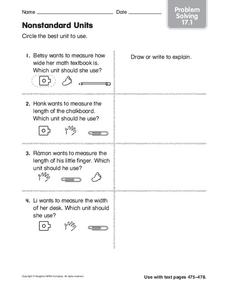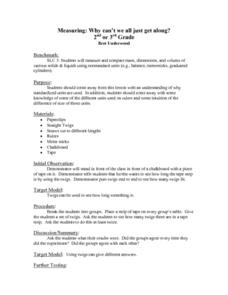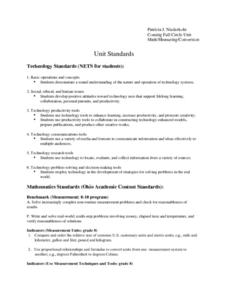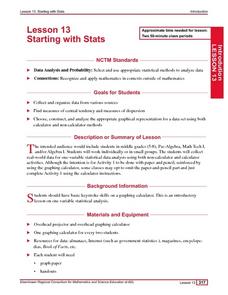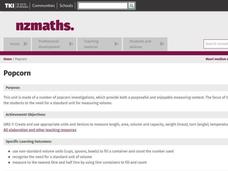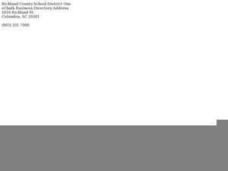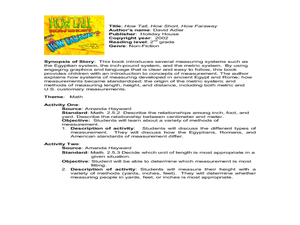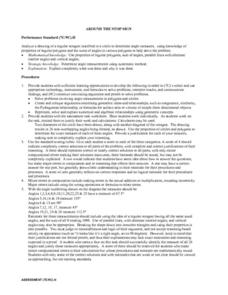Curated OER
Units and Measurement
Students discuss the word weight, how much they weigh and the conccept of heavy and light. They hear the story of measurement and the metric system. They work in groups and measure and record items found in the classroom and use a...
Curated OER
Nonstandard Units
In this non-standard units worksheet, students circle the best unit to use to measure given items, drawing or writing to explain their work. Houghton Mifflin text is referenced.
Curated OER
Can You Build It?
Students investigate the concept of perimeter. They design there own figure and measure the perimeter of it. The lesson is given the context of the shape being a path that is traveled by a ladybug. This provides the shape of the plane...
Curated OER
Measuring With the Gingerbread Man
In this measurement worksheet, students complete a 3 column graphic organizer where they list items smaller than. the same size as, and bigger than a picture of a gingerbread man.
Curated OER
Measuring: Why Can't We All Just Get Along?
Young scholars examine why having standardized units of measurement is important. They investigate the use of non-standard measure, twigs, while measuring the piece of tape. Next, they experiment with straws, paper clips, and rulers...
Curated OER
How Big is a Foot?
First graders practice nonstandard measurement and estimating and measuring lengths of objects.
Mathematics Assessment Project
Mean, Median, Mode, and Range
What a find! Here is a lesson, designed to meet sixth grade math Common Core standards, that focuses on the calculation of different measures of center for the scores from a penalty shoot-out competition. An independent...
Curated OER
Sand Babies
An engaging activity which has elementary learners measure weight to the nearest pound and construct and interpret a bar graph! They measure length using non-standard units and determine area using square tiles. Pupils round their birth...
Curriculum Corner
8th Grade Math "I Can" Statement Posters
Clarify the Common Core standards for your eighth grade mathematicians with this series of classroom displays. By rewriting each standard as an achievable "I can" statement, these posters give students clear goals to work toward...
Curated OER
The Great Cover Up!
Students use non-standard measurement tools such as body parts, beans and counters to find the area of shapes drawn on the floor. They continue to determine the area of other objects in the classroom.
Curated OER
Jack and the Beanstalk: Plant a Bean and Watch It Grow
Students plant bean seeds, watch them grow, and measure them with non-standard objects. They describe the bean's growth in a journal and record the growth on a calendar.
Curated OER
Metric Olympics
Students participate in a Metric Olympics event and use metric measurements to measure actual performances in their events. They throw a plastic straw for a javelin event, participate in a long jump and high jump event, and a variety of...
Curated OER
Estimating And Measuring Weight: Grams And Kilograms
In this measuring worksheet, students will estimate the weight of 10 objects and record information in grams and kilograms. Then students will weigh the objects and record the actual weight to complete a table.
Curated OER
Estimating and Measuring Capacity: Millilitres And Litres
For this estimating and measuring worksheet, learners will estimate the capacity of 10 objects and record information in liters and milliliters. Then students will measure the actual capacity of these objects and record to complete a table.
Curated OER
Va Va Va Zoooommm
Young scholars, in groups, measure a variety of physical components to several activities. They use both standard and non-standard forms of measurement and then develop conclusions about the use of units in measurement.
Curated OER
Starting With Stats
Statisticians analyze a data set of student IQs by finding measures of central tendency and dispersion such as mean, median, mode, and quartiles. They practice using a graphing calculator to find the values and analyze box plots and...
Consortium for Ocean Science Exploration and Engagement (COSEE)
Ocean Acidification: Whats and Hows
Open this activity by demonstrating the production of acidic carbon dioxide gas by activated yeast. Emerging ecologists then experiment with seashells to discover the effect of ocean acidification on shelled marine organisms. They...
Curated OER
Popcorn
Hungry learners perform a number of popcorn investigations. They investigate the volume of popcorn kernels before and after popping. They use both standard and non-standard units of measurement to measure the kernels.
Alabama Learning Exchange
Are You a Square or a Rectangle?
Discover the difference between standard and non-standard units of measure with your class. They differentiate between rectangles and squares, read a book, measure a peer's height. They then discuss measurement methods, make...
Curated OER
Measurement Mania
First graders measure 10 different objects found in the classroom, including their own hands and feet, then record their findings. This is a fun lesson for students to experience measurement using a ruler and unifix cubes.
Curated OER
Light Plants and Dark Plants, Wet Plants and Dry Ones
Young scholars plant sunflower seeds in plastic cups, and once germinated, these are exposed to different conditions of light levels and/or soil moisture contents. Students measure growth of the seedlings every few days using...
Curated OER
Inching Our Way through Measurement
Students review how to use an inch ruler and listen to the story, Inch by Inch by Leo Lionni. In this measuring lesson, students work in small groups to create an Inch Poster. Students then use an inch ruler to measure different objects...
Curated OER
How Tall, How Short, How Faraway
Second graders determine the correct unit of measure to use for different situations. In this measuring lesson, 2nd graders are introduced to different unit of measure. Students study the origin of measurement and practice measuring....
Curated OER
Around The Stop Sign
Young scholars analyze a drawing of a regular octagon inscribed in a circle to determine angle measures, using knowledge of properties of regular polygons and the sums of angles in various polygons to help solve the problem. They use...



